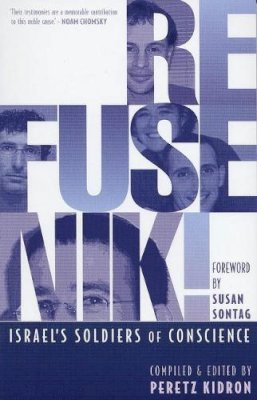17%OFF

Stock image for illustration purposes only - book cover, edition or condition may vary.
Refusenik!
Unknown
€ 45.99
€ 38.26
FREE Delivery in Ireland
Description for Refusenik!
Paperback. In Israel, hundreds of soldiers called up to take part in controversial campaigns or assignments have refused orders. This text presents the stories, experiences, viewpoints and poetry, of these officers and ordinary footsoldiers, men and women, from every ethnic background and class. Editor(s): Kidron, Peretz. Num Pages: 144 pages, notes. BIC Classification: 1FBH; GTJ; JPVH; JWL. Category: (P) Professional & Vocational; (UP) Postgraduate, Research & Scholarly; (UU) Undergraduate. Dimension: 215 x 148 x 9. Weight in Grams: 195.
Hundreds of Israeli soldiers, called up to take part in controversial campaigns like the 1982 invasion of Lebanon or policing duties in the Palestinian territories today, have refused orders. Many of these 'refuseniks' have faced prison sentences rather than take part in what they regard as an unjust occupation in defence of illegal Jewish settlements. In this inspirational book, Peretz Kidron, himself a refusenik, gives us the stories, experiences, viewpoints, even poetry, of these courageous conscripts who believe in their country, but not in its actions beyond its borders. We read about the cautious, even embarrassed, response of the authorities. And we see the wider implications of the philosophy of selective refusal - which is not the same thing as pacifism -- for conscientious citizens in every country where conscription still exists. Here is a real model for the peace movement in Israel and worldwide.
Product Details
Format
Paperback
Publication date
2004
Publisher
Zed Books Ltd United Kingdom
Number of pages
144
Condition
New
Number of Pages
144
Place of Publication
, United Kingdom
ISBN
9781842774519
SKU
V9781842774519
Shipping Time
Usually ships in 5 to 9 working days
Ref
99-1
About Unknown
Peretz Kidron was born in Vienna in 1933. Months after the Nazi occupation of Austria, his family fled to Britain. On graduation from high school, he emigrated to Israel where he lived for 20 years in Zikim, a border kibbutz near the Gaza Strip, where he grew oranges, taught school, and engaged in voluntary work. A freelance journalist, broadcaster and writer, he has translated many books, including the memoirs of Yitzhak Rabin and Ezer Weizman, and a biography of David Ben Gurion. In 1976 he co-authored with the Palestinian activist, Raymonda Tawil, her memoirs My Home, My Prison. In the late sixties, he became active in the radical left and peace movement. He is a founding member of the Council for Israeli-Palestinian Peace and serves on the steering committee of the human rights watchdog Betselem. Having refused to perform military duty in the occupied Palestinian territories, he now handles international contacts for Yesh Gvul ('There is a limit [to what an army can ask of its conscripts]'). Founded at the time of the invasion of Lebanon in 1982, the group became the voice and campaigning vehicle for the so-called refuseniks -- Israeli army reservists who report for duty when summoned but refuse morally objectionable assignments (notably serving on the West Bank and Gaza).
Reviews for Refusenik!
'Our greatest admiration must go to those brave Israeli soldiers who refuse to serve beyond the 1967 borders?. These soldiers, who are Jews, take seriously the principle put forward at the Nuremberg trials in 1945-46: namely, that a soldier is not obliged to obey unjust orders - indeed, one has an obligation to disobey them.' Susan Sontag, novelist, essayist and playwright 'Resistance to crimes of state, and refusal to participate in them, has been and remains one of the most significant achievements of people of decency and courage throughout history. The Israelis who have undertaken this honorable course merit the greatest admiration and respect. Their testimonies are a memorable contribution to this noble cause.' Noam Chomsky 'This collection of statements from soldiers who joined Yesh Gvul... should give pause for thought to all those diaspora Jews who preoccupy themselves with looking for ‘balance‘ and ‘even-handedness‘ in media reporting of events in the territories, rather than facing up to the devastating moral erosion that 37 years of occupation has wreaked on Israel‘s citizen army... It was once said of people who lived near concentration camps but claimed no knowledge of what went on inside, that those who didn‘t know, didn‘t want to know. Jews who still try to defend retention of the West Bank are in a similar category.' David J. Goldberg, The Jewish Chronicle
